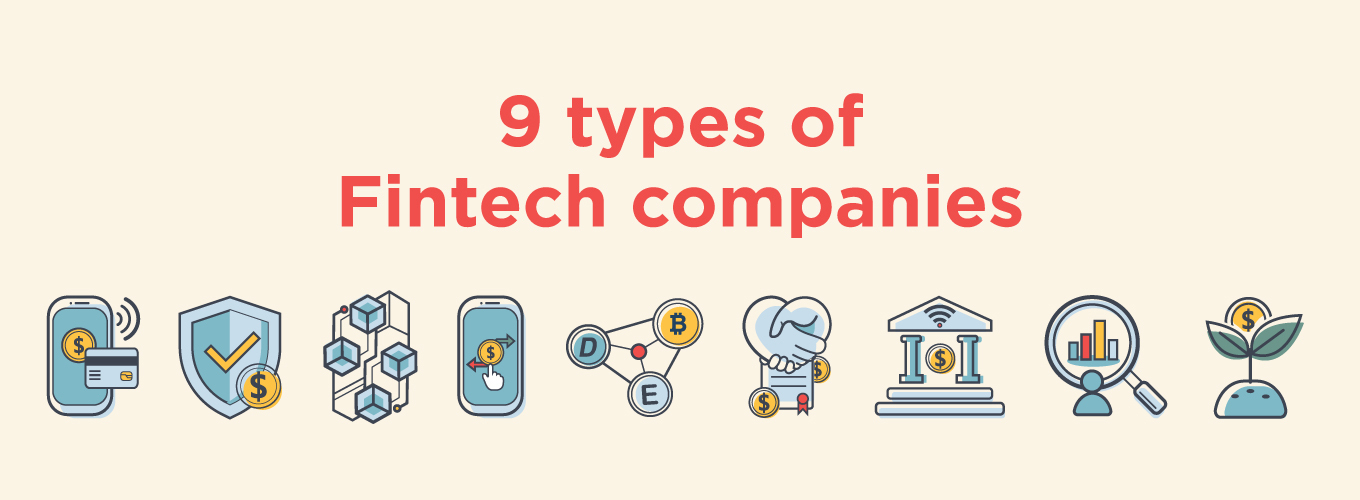9 types of Fintech companies
Fintech is a revolutionary experience where financial transactions are done so easily with just a few clicks. That is the beauty of the innovation called fintech (financial technology) where technology enables, automates and enhances the delivery of financial services. Fintech has changed the way we save, invest and borrow money by making the transactions easy without the intervention of a physical bank. From payment apps to cryptocurrency to insurance payments, fintech is leading the way with providing better financial services to people and businesses alike.
Table of Contents
Fintech is experiencing great changes with new start-ups and apps offering smarter, quicker and easier ways to manage our finances. Fintech companies can be either in B2B (enabling businesses to connect with other businesses) or B2C (businesses connecting directly with their customers). There are many types of fintech companies. These are discussed in this article.
Mobile payments and digital wallets
Any app that you use to make payments to retail establishments or for online purchases are defined as mobile wallets. For instance, Google Pay or Apple Pay are examples of mobile payment wallets. One can send funds through mobile payments to family members or friends or even split grocery bills by paying a part through a mobile payment app. One can even buy food through mobile payment on apps like Swiggy and Zomato.
Also Read: Fintech Recruitment: Best Practices
Insurance
Insurance companies are hugely tech-driven and take advantage of the ease of technology to provide services. From providing insurance details to renewals of policies to enabling all insurance information on an app, fintech has transformed insurance companies using technology. Fintech in insurance is also called insurtech and it uses artificial intelligence (AI), chatbots, predictive analytics to analyze data to make decisions on compensation. These are not part of science fiction but that of everyday work in insurance companies.
Crowdfunding platforms
Many causes use crowdfunding platforms to raise funds which enable small individuals or even NGOs to receive basic or additional funds for their needs. Crowdfunding is a very sustainable option of sourcing small amounts of money from various stakeholders who are willing to donate for a cause or an individual need and thus negates the need to go to a bank for a loan. These crowdfunding platforms have tech-enabled ways to receive money from donors and pass them on to the beneficiaries. There are many reputed crowdfunding platforms that provide this service and allow easy listing for individuals, NGOs or even businesses. A crowdfunding app provides dashboards, reports, account management, transaction records, recharges and details of withdrawals.
International money transfers
Transferring money internationally was a challenge till a few years ago when fintech revolutionized it. Banks offer this service but the charges are pretty high. Fintech companies in this business offer easier, faster and cheaper ways of transferring money between countries making it easier for families to reach funds to their near and dear ones in various countries. Many companies can transfer money within seconds and make these fintech services irreplaceable.
Also Read: What Is FinTech And Why Is It Important?
Blockchain and cryptocurrency
Cryptocurrencies are digital coins or tokens that exist only in the digital world. They are not physical in nature. Cryptocurrency is fast becoming a popular investment option, especially for the younger generation. They use this simple and convenient method to buy and sell cryptocurrencies. The biggest benefit of cryptocurrency is that it is highly secure and based on strong encryption. This means that only if a user has a key code, they can access the data. Cryptocurrencies can be used for payments and remittances without the risk of fraud. There are many cryptocurrency exchanges as well with many users. Many crypto-platforms help you build a good crypto-portfolio. Blockchain enables cryptocurrencies by storing data across its network and eliminating the risk of data counterfeiting. Blockchain facilitates secure transfers.
Lending and business loans
Borrowing money has been simplified by fintech. With modern fintech products, it is easy to get a loan since these tech-enabled apps analyze your credit worthiness within seconds automatically. This helps save time and improves customer experience greatly. Not only for individuals, it has become easier for small businesses to also access funds and secure finance. Some apps link borrowers with investors and businesses get access to funds for working capital, payroll, purchases or expansion.
Consumer banking
Fintech companies offer ease with banking facilities like applying for debit or credit cards with easy approvals and no fees. There is absolutely no need for the bank to be physically involved with these. Fintech platforms integrate with the bank and provide seamless service thus making banking more convenient and accessible for everyone.
Stock trading
Bots are being used to give smart recommendations for investment. These are being preferred over hiring an expert who will work only limited hours. Stock trading apps can help perform all operations on your mobile phone, from any location without having to go to a stock exchange. You can invest, choose portfolios and review your investments all in one place. These apps allow you to invest lump sums or a certain amount per day or even round up after purchases and invest the spare change every time you shop.
Budgeting apps
These apps provide budgeting tips on mobile phones. They have replaced excel sheets and notebooks and provide resources for managing your money, calculating your monthly payments and enabling smart savings. They help you keep tabs on your various subscriptions, get personalized insights and suggest fresh ways to manage money. They help you reach your financial goals by analyzing your monthly bills and spending patterns and creating budgets and helping you save money.
Conclusion
Fintech is literally the future of the finance industry. It has improved the way money is managed, invested, saved and shared in the world. New fintech products and apps are being innovated every day to manage money more effectively. Fintech is clearly challenging all traditional finance players by offering nimble, quick and creative services. Start-ups are coming up with new tech trends and innovations and traditional financial institutions are also picking up the pace in order to compete and not be left behind. Bottom line: Fintech is here to stay and there are newer fintech companies mushrooming in the landscape offering a variety of products and services making the financial world buzz with action.
Ready to start your job hunt? Check out the Xpheno Job Board today!









